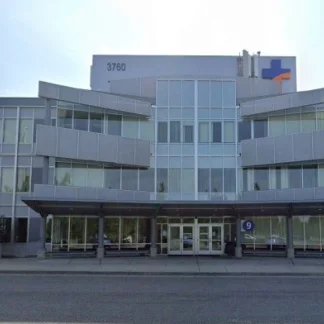North Star DeBarr Hospital
Northstar Debarr Hospital, located in Anchorage, Alaska, provides mental health ...
Providence Breakthrough is a private rehab center found in Anchorage, Alaska, that specializes in treating opioid addiction, alcoholism, and dual diagnosis. It is a faith-based recovery center that doesn’t discriminate based on age, race, gender, or financial standing.
Individuals 13 and older can attend this addiction treatment center. Its programs are led by qualified health staff made up of doctors, nurse practitioners, counselors, psychiatrists, and peer support specialists. The programs offered follow the 12-step principles alongside evidence-based therapies. To learn more, look below:
The medication-assisted treatment (MAT) program offered at this rehab center combines medications and therapy to give each individual a whole-person approach to recovery. Various medications are offered, and attending counseling sessions is compulsory.
Those requiring a more intensive level of care within an inpatient setting while still enjoying the flexibility of home life can attend the partial hospitalization program (PHP) provided at this addiction treatment center. This PHP is highly structured and provides full-time care and support to those battling drug and alcohol addiction.
The outpatient and intensive outpatient programs at Providence Breakthrough are ideally suited to those who don’t require full-time addiction treatment. Both of these programs provide individual and group counseling, with the IOP requiring a longer-term commitment with more weekly sessions than the OP.
Contact us for more information: (907) 212-6970

Connect with Providence Breakthrough by calling their admissions team directly.
(907) 212-6970 Website Get DirectionsResearch clearly demonstrates that recovery is far more successful and sustainable when loved ones like family members participate in rehab and substance abuse treatment. Genetic factors may be at play when it comes to drug and alcohol addiction, as well as mental health issues. Family dynamics often play a critical role in addiction triggers, and if properly educated, family members can be a strong source of support when it comes to rehabilitation.
Group therapy is any therapeutic work that happens in a group (not one-on-one). There are a number of different group therapy modalities, including support groups, experiential therapy, psycho-education, and more. Group therapy involves treatment as well as processing interaction between group members.
Trauma therapy addresses traumatic incidents from a client's past that are likely affecting their present-day experience. Trauma is often one of the primary triggers and potential causes of addiction, and can stem from child sexual abuse, domestic violence, having a parent with a mental illness, losing one or both parents at a young age, teenage or adult sexual assault, or any number of other factors. The purpose of trauma therapy is to allow a patient to process trauma and move through and past it, with the help of trained and compassionate mental health professionals.
Group therapy is any therapeutic work that happens in a group (not one-on-one). There are a number of different group therapy modalities, including support groups, experiential therapy, psycho-education, and more. Group therapy involves treatment as well as processing interaction between group members.
Trauma therapy addresses traumatic incidents from a client's past that are likely affecting their present-day experience. Trauma is often one of the primary triggers and potential causes of addiction, and can stem from child sexual abuse, domestic violence, having a parent with a mental illness, losing one or both parents at a young age, teenage or adult sexual assault, or any number of other factors. The purpose of trauma therapy is to allow a patient to process trauma and move through and past it, with the help of trained and compassionate mental health professionals.
Trauma therapy addresses traumatic incidents from a client's past that are likely affecting their present-day experience. Trauma is often one of the primary triggers and potential causes of addiction, and can stem from child sexual abuse, domestic violence, having a parent with a mental illness, losing one or both parents at a young age, teenage or adult sexual assault, or any number of other factors. The purpose of trauma therapy is to allow a patient to process trauma and move through and past it, with the help of trained and compassionate mental health professionals.
Northstar Debarr Hospital, located in Anchorage, Alaska, provides mental health ...
AK Child and Family - Jesse Lee Campus provides alcohol and drug rehab treatment...
Jett Morgan Treatment Services offers outpatient services for individuals with a...
Day Break, located in Anchorage, Alaska, provides several outpatient community m...